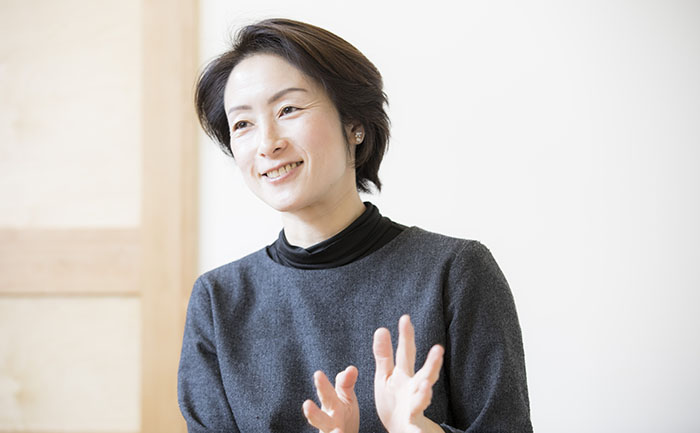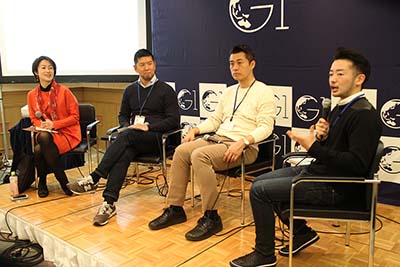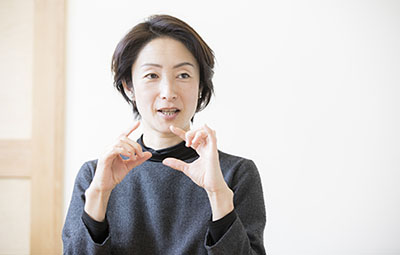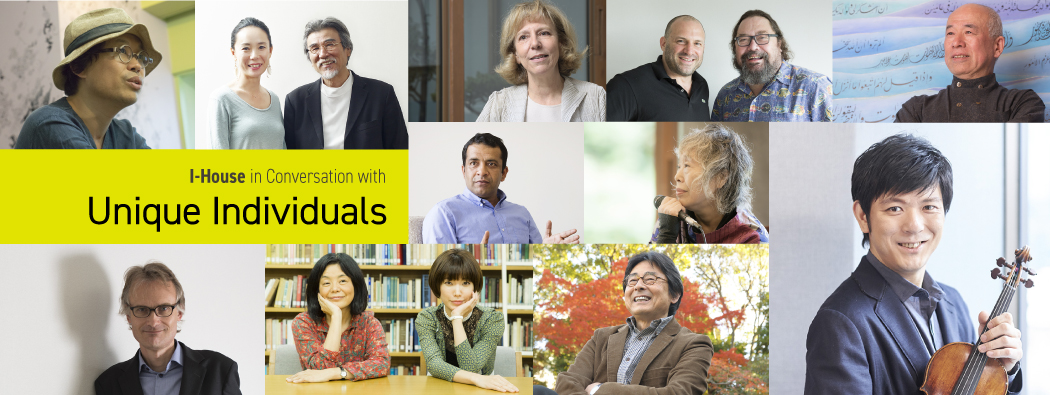Interview: In Conversation with Doi Kanae “How Japan Can Achieve ‘Unity in Diversity'”
“Unity in Diversity” is one of the visions for the Olympic and Paralympic Games Tokyo 2020. With the event now just two years away, is Japan making progress toward that goal? We recently sat down with Doi Kanae, a lawyer, longtime human rights advocate on the global stage, and the Japan Director for Human Rights Watch, to talk about how the international community sees Japan’s current standing and the prospects for future progress on such issues.
[November 2017]

Doi Kanae Japan Director, Human Rights Watch
Born in Kanagawa Prefecture in 1975, Doi Kanae is the Japan Director for Human Rights Watch. After passing Japan’s National Bar Examination in 1996 while still a student at the University of Tokyo, Doi went on to work as an attorney in Japan from 2000 to 2016, during which she championed the cause of refugees and urged revisions to the Refugee Recognition Act. She earned a master’s degree in international studies from the New York University School of Law in 2006 and then passed the New York State Bar Examination in 2007. She assumed her current position at Human Rights Watch in September 2008.
The “Unity in Diversity” vision for the Tokyo Olympics has a lot to do with human rights. How do Japan’s current human rights policies look in the global context?
Things aren’t terrible—Japan doesn’t have the kinds of abject discriminatory or exclusionary policies that you’ll find in some other countries. But it is also the case that the rights of women, ethnic minorities, LGBT people, other sexual minorities, people with disabilities, and foreign nationals, including refugees, aren’t as secure as they should be. Most countries have laws that establish basic human rights— safeguards against irrational discrimination and exclusion based on people’s inborn qualities and attributes. Looking at other countries, you’ll find an administrative system in place for protecting human rights: laws against discrimination and monitoring agencies mediating any such violations. Japan is an extremely rare case: a first-world country without any kind of human rights commission.
You’re part of a working group for the Olympic Organizing Committee, too.
That’s right. My role has a lot to do with sustainability, looking specifically at environment and human rights issues, but it can be a bit of a struggle [laughs]. When it comes to the environment, there are specialists in the government and all across the private sector. You can’t say the same for human rights, though; there are hardly any qualified experts in the government sector. It’s sad to see Olympic organizers touting the “Unity in Diversity” message without having anyone on the Organizing Committee with the skills to actually make that possible. That’s one reflection of how Japan is still a few decades behind the rest of the world.
What does Human Rights Watch do?
Human Rights Watch is an international NGO, operating in 90 different countries. Its goal is to help change the world by making policy recommendations, lobbying governments, and drawing attention to key issues through media exposure, which are all based on extensive research. Focusing primarily on the three key components promoting diversity and inclusion, protecting the human rights of noncombatants under wars and conflicts, and safeguarding human rights in dictatorships, we look into a wide array of different issues and publish around 80 reports a year. A recent report on conditions in Japan, published in May 2016, shed light on bullying and exclusion of LGBT students in schools.
It seems like more and more people are developing an awareness of LGBT issues, even in Japan. Would you say that’s true?
Well, certainly Shibuya City made news when it approved “partnership certificates,” and I think we’ve been seeing some major improvements in overall social awareness and institutional reforms over the last five years or so. There are still sizable generation gaps in perceptions, but younger age groups are definitely doing much to change social attitudes. Still, there’s a lot of work to be done. Take the Act on Special Cases in Handling Gender Status for Persons with Gender Identity Disorder, which the government started enforcing in 2004, for example. The law created a list of tough conditions that people with gender-identity issues have to meet to change their gender in their official family registers. Another point Human Rights Watch finds problematic is compulsory sterilization. Mandating people to go through surgery, which permanently sacrifices their sexual and reproductive rights, in order for them to change their gender, is a clear case of human rights abuse. Some UN experts even argue that such a custom is tantamount to torture. Only a handful of developed countries impose such strictures—and Japan is one of the remaining few.

At a conference on gender and diversity in 2017. (Photo courtesy of GLOBIS Insights)
What did you learn from your research at schools?
Teachers play an enormous role in every school environment, but our research exposed a kind of blind spot: there were lots of educators who simply had no idea about the existence of LGBT students, a segment of students that didn’t figure specifically into the government’s anti-bullying directives as of 2016. Some teachers were so oblivious to the issue that they’d hurl verbal abuse at LGBT students, much less accommodate their bathroom and locker room needs. We recommended that schools institute programs for training teachers and that schools are also mandated to develop relevant educational materials. Progress is starting to come along now, with some institutions explicitly addressing the “LGBT student” population and requiring appropriate treatment, but you can’t always assume that a change in school rules will reach every single educator. To make sure that fair, considerate treatment is given to every student in need, not just a matter of whether a student’s lucky enough to get a well-informed teacher, you have to make the right reforms to the legal system.
Why is it taking so long for Japan’s laws to catch up?
In the 1990s, there was this global surge in human rights advocacy—countries started setting up commissions, appointing ombudsmen, and passing laws that would provide remedies for sexual and racial discrimination. Japan appeared to be riding the same wave, as members of the Liberal Democratic Party drafted a bill for new human rights-related legislation, but in the end nothing was passed. It was just around the time when the North Korean abduction issue put Zainichi Koreans on the receiving end of considerable antagonism. Part of the reason that the bill failed to materialize, though, was media opposition: the original draft included some provisions that specifically targeted human rights violations by the press, which rubbed some outlets the wrong way. Lawmakers tried to get human rights issues back on the table a few more times after that, even with the support of the Ministry of Justice and other players, but political objections ended up thwarting the effort. If we had the right laws in place, human rights violations would become more visible in society—and that would help shape people’s behavior.
How did you go from working as an attorney to being a human rights activist?
I decided to become a lawyer when I read Ningen no daichi [People’s Earth], a report on refugee camps by Inukai Michiko, in middle school. Of all the possible approaches I could’ve taken, I decided to go with the human rights angle when I was just getting my feet under me in the legal field. I was working on cases for Afghan refugees and company employees facing false accusations, and I met people— often about the same age as me—whose freedom had been ripped away, and I saw their hopes and dreams being extinguished for no legitimate reason. I did some volunteer work distributing food to refugee camps, but it all felt so condescending and self-serving to me, like I was “bestowing” something from some kind of comfortable, privileged perch. Human rights are more of a bottom-up movement: you side with the people under oppression, taking on the higher-ups behind the wrongdoing. That basic stance really resonated with me.
Japan has made minimal progress in terms of allowing refugees into the country. Over 10,000 people applied for refugee status in Japan in 2016, but the Japanese government only accepted 28. What are your thoughts on that?
As someone who got her start as a lawyer in refugee problems, it’s really frustrating to know that things have hardly changed at all over the last 20 years. There’s probably some kind of specific rationale for each individual application refusal, but the overarching theme is that Japan doesn’t really have the mentality to welcome any foreign people, let alone refugees, into its social fabric. The government even sees highly skilled foreign nationals as “exceptions” to let into the country. I won’t make any generalizations about the public at large, but it seems like some politicians are convinced that Japan is a nation of one, exclusive ethnicity—a tribal mindset that seeks its roots in ancient history.
But isn’t Japan a party to the Convention Relating to the Status of Refugees, an international treaty?
Countries read the same treaty in different ways. The text of the convention itself defines a refugee as someone outside the country of their nationality and is unable or, “owing to well-founded fear of being persecuted,” unwilling to return to it, which is pretty ambiguous. It leaves a lot of room for interpretation—especially in terms of how countries are supposed to determine the potential for future persecution and how to establish that the person has a “well-founded fear.” Nobody can predict the future, obviously, so it’s never been easy to prove grounds for refugee status. Even so, Japan’s criteria for recognizing oppression and proving persecution are almost impossible to satisfy. Someone fleeing Afghanistan might tell the Japanese authorities there is proof of personal persecution back home, but the authorities won’t even hear the case until hard evidence is presented. Other countries might recognize that such proof is impossible under such conditions, but not Japan. Of course, some people might try to gain refugee status for purely economic reasons, but Japan has probably turned away a considerable number of people who would’ve been legitimate refugees in other countries’ eyes.
Human Rights Watch does a lot of work on rights for orphans and abandoned children, too, but awareness of children’s rights seems pretty low in Japan.
I’d agree. There’s an international treaty called the Convention on the Rights of the Child, which stipulates that every child has the right to live within a family grouping. Basically, institutionalizing children is a last resort—that’s the general global consensus. In Japan, though, even now, several decades after the Second World War, over 80% of orphans and abandoned children live in institutional settings. Only 15% live with foster parents, a proportion that—like Japan’s refugee-acceptance rates—is startlingly low relative to other countries. We submitted a policy recommendation to the Japanese government, which resulted in revisions to the Child Welfare Act in 2016. The government made it clear that children are to be raised in family settings, by their birth parents, foster parents, or adoptive parents, and should only be institutionalized in exceptional cases. While the terms of the law have changed, the realities haven’t. Children don’t have a powerful voice in society, first of all, and there’s this whole industry of social care that rests on institutional custody. People don’t even think of foster care as an option. We have to work with the government to help the public see foster care as a form of social contribution—and know that becoming a foster parent is a valid life choice that people can really make.

In your view, what goes into forging a diversity rich society? What do we need to do to get there?
In relatively homogenous societies like Japan, it’s hard for people to connect with the idea of discrimination on a personal level because it’s not easy to see around them. They tend to think of it as something that minorities experience, which is oversimplifying things. Everyone’s different, even people from the same race. You might think you’re in the majority, but there’s always a chance that you’ll find yourself in a weaker position: you could get pregnant, sick, or injured, for example, or simply find yourself dealing with aging. Wouldn’t you want to be able to keep making the most of your talents and abilities? That’s the perspective I want people to have about human rights. With the Olympics coming up, we’ve got an incredible opportunity to boost that kind of awareness. The Sochi Winter Olympics in 2014 put LGBT issues in the headlines, with numerous world leaders sitting out the opening ceremony in protest against the Russian government’s LGBT policies. Past instances of eviction and forced labor for stadium-building projects have also linked the Olympics with significant human rights violations. Given that context and the visibility of the event, organizations around the world have been trying to transform the Olympic Games into a positive symbol for human rights for the last decade or so—and that’s why I want people to be able to truly call the Tokyo Olympics the “human rights Olympics.” Japan’s going to be in the global spotlight in 2020. The event could be a new beginning for Japan, giving the country the momentum it needs to achieve progress on human rights.
This interview was conducted in Japanese on November 29, 2017.
Interviewers: Sasayama Yuko, Ozawa Miwako (Program Department, International House of Japan)
Photographer (interview): Aikawa Ken’ichi
©2019 International House of Japan
To view other articles, click here.




